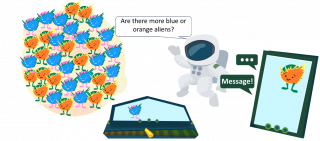This is why your teenager is ignoring you
New study shows that teenagers’ ability to judge the quality of their own decisions drives their tendency to ignore advice.
Teenagers are notorious for ignoring others’ advice. Even Socrates, the ancient Greek philosopher, complained about young people’s “disrespect for elders” over 2000 years ago. But how did teenagers earn this reputation? And is it deserved?
Now, scientists from the Centre’s Developmental Computational Psychiatry team have investigated the key mechanisms underlying the decision to take advice, or ignore it. Unfortunately for parents, the researchers found that teenagers are more likely than younger children to ignore advice – but only when they do actually know better.
The secret to teenagers’ infamous stubbornness may lie in the development of ‘metacognition’, a skill which matures from childhood to adolescence, according to the study, published this week in Developmental Science.
“Metacognition describes your insight into your own decisions and your ability to judge whether the decisions you make are good or bad”, explains Madeleine Moses-Payne, first author of the study, “Some people have a strong insight into their own decisions and know exactly when they made a good or bad decision, while others are less able to reflect on the quality of their decisions.”
The team, led by Dr Tobias Hauser, investigated children and teenagers’ metacognition and advice taking behaviour using an alien-themed computer game. In the ‘Space Explorer’ game, children and teenagers had to make simple decisions about whether there were more blue or orange aliens on a planet. Once they had decided, they were offered advice from a friendly ‘space advisor’, and could choose to stick with their original decision, or change their mind.

By comparing children and teenagers, the scientists showed that teenagers were better able to tell apart good from bad decisions, whereas this skill was less developed in children. Whilst children took on more advice generally, they also listened to bad advice, making their decisions worse. Teenagers, however, used their newly-developed metacognitive skills to decide when to listen and when not to. In this way, teenagers made better decisions. Not only do they know better, teenagers know that they know better.
“Teenagers know when they can rely on themselves and ignore others who make poor suggestions,” comments Moses-Payne, “Of course, here we are assessing very simple decisions. For more complex decisions, teenagers’ metacognition may not yet be well calibrated, meaning that teenagers ignore others’ advice even when it would have been better to listen”.
So was Socrates right? Yes and no. True, teenagers tend to not follow the advice of others as much as children. However, they do so in an informed and clever way. By developing metacognitive skills, teenagers can start becoming independent decision makers and build up their own sense of identity and autonomy. Allowing teenagers to make independent decisions helps them to figure out their own place in society and their own sense of values.
As a next step, the researchers are interested in what happens if teenagers do not develop good metacognitive skills. “We believe that this may influence young people’s mental health”, says Dr Hauser, senior author of the study, “and this is particularly critical because most mental health problems arise during adolescence. Most importantly, we wish to find ways to help those teenagers that do struggle with their mental health.”
This is why Dr Hauser’s team have released the free ‘Brain Explorer’ smartphone app, where users can play brain games similar to ‘Space Explorer’. The ‘Brain Explorer’ app is available for anyone aged 9 upwards and you can read more about it here.